Two Weeks That Change Go Players: Inside the EGC
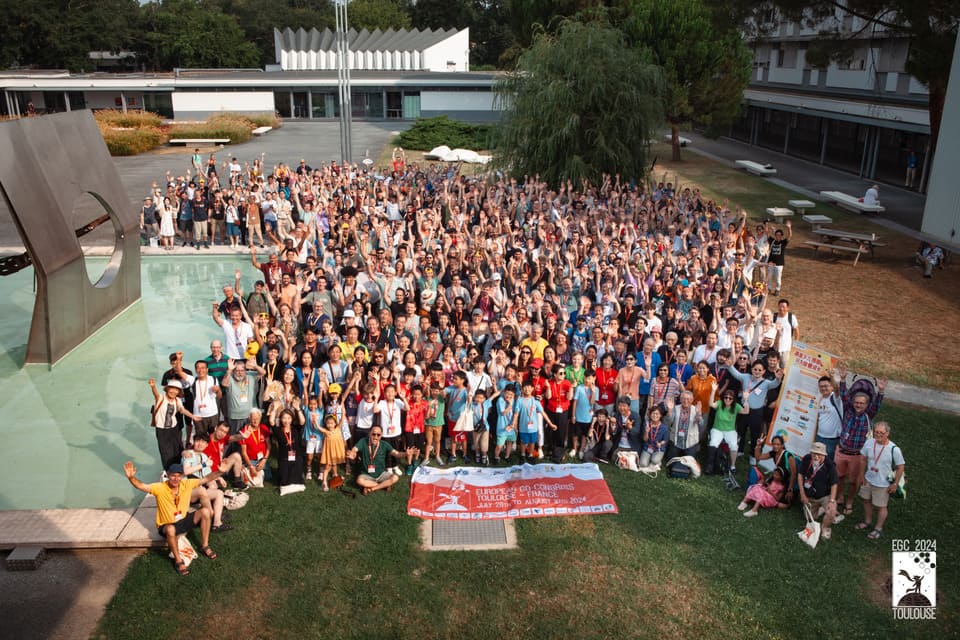

History and general info
“Congress.” What comes to mind? Suits, speeches, and endless PowerPoint slides? The European Go Congress (EGC) defies all of it. Imagine two weeks where the clatter of stones replaces slide clickers, “networking” means debating joseki over strudel, and the dress code ranges from T-shirts to actual kimonos. It’s the closest thing Go has to a pan-European festival—and if your feed is buzzing about EGC 2025, here’s why it’s earned its place as the highlight of the European Go calendar.
A Gathering With History
The first European Go Congress took place in Cuxhaven, West Germany, in 1957, organized by the German Go Association. Only 23 players attended—a modest start compared to today’s hundreds—but it laid the foundation for what would become Europe’s most enduring Go tradition. Those early years were less about trophies and more about building a community; results were handwritten, clocks were optional, and games spilled into hotel lobbies at midnight.
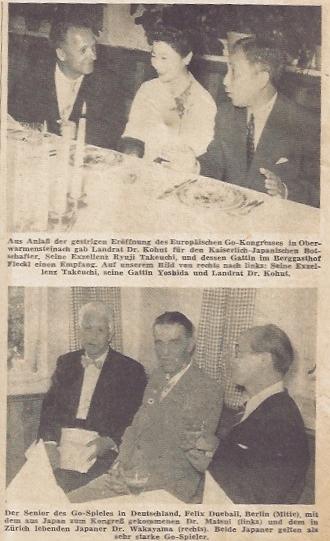
By the 1970s, the Congress had outgrown its humble roots, drawing over 100 players and introducing structured tournaments. The 1980s saw the first pro attend (Kato Masao from Japan in 1984), and the 1990s brought cultural quirks: one year in Finland featured a lakeside game on a floating board, while a Czech edition included a tournament inside a medieval castle.
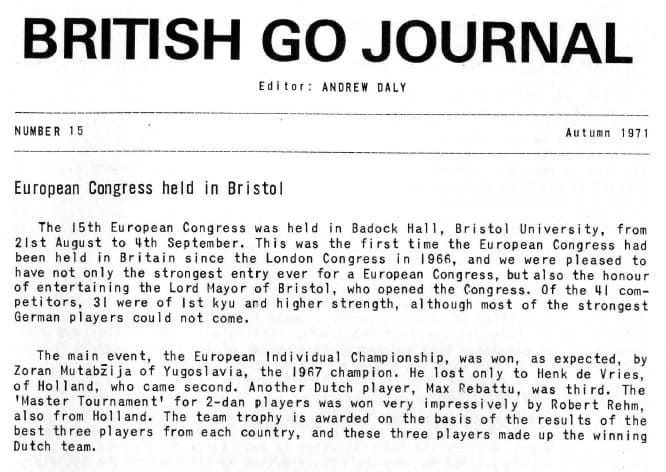
Over decades, it grew into the continent’s largest annual Go event, rotating host countries and absorbing local flavors—whether played in a Viennese ballroom, a Bulgarian seaside resort, or a Polish university hall. The core remains the same: serious tournaments, casual play, and a chance to connect with the Go world.
More Than a Tournament
Today, the EGC rotates host cities like a Go-themed Eurovision, absorbing local flavors. A Vienna edition might pair games with waltz music; a Bulgarian host could add Black Sea seafood dinners. Yet the heart remains unchanged:
- Mornings for focused tournament rounds,
- Afternoons for simuls with pros or post-game reviews,
- Nights for blitz, bar debates, or exploring the host city with new friends.
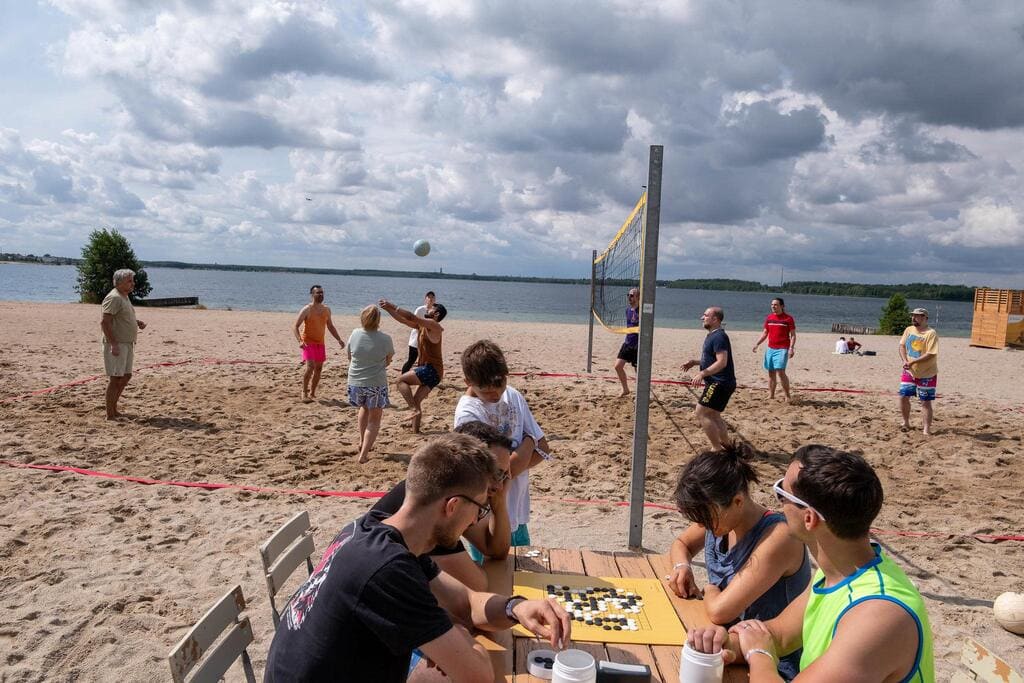
It’s this mix—tradition and spontaneity, competition and camaraderie—that keeps players returning decades later. To understand how it all comes together, we asked Pietro Simonini, our League Manager and an EGC 2024 attendee, to share his perspective.
Interview with Pietro
Was EGC 2024 your first Congress? If not, how many have you attended?
ECG 2024 was my second Congress. I attended EGC 2023 in Leipzig the year before, and I loved it so much that I immediately registered for Toulouse.
The first time I approached Go was in 2018, just a month before the EGC in Pisa. At the time, I got curious about participating since it was so close to where I live, but I decided against it. That was a terrible choice. If you’re a beginner thinking about visiting EGC, I strongly suggest you go—it’s a great experience no matter your level.
What convinced you to go for the first time?
Mere curiosity. I had been participating in several tournaments around my country but never abroad, and I wanted to see what a large European-scale event was like.
I had no expectations beyond it being a big, cool tournament, and I was pleasantly surprised.
Did you have a “wow, this is special” moment?
I think just seeing so many people fussing around boards and talking about Go was enough to sell me on the event. The atmosphere it creates is really unique; being so fully immersed in the game is a rare opportunity.
The largest Go event I had ever attended before had about 40 players, so I experienced a kind of culture shock.
What’s one thing you’d never guess about the EGC without attending?
How friendly and familiar such a big event can be! It’s all very open and approachable. Being highly introverted, I worried a lot before my first EGC about having to navigate through a large congress, but I never once felt uncomfortable—quite the opposite.
Where do the most memorable off-board conversations happen?
The food area is often the most lively place at all times. You’ll always find plenty of people chatting about Go and other, obviously less important, stuff.
There will also be non-Go events like board games night, music, and more. In Toulouse, I joined a crochet workshop in between games and made this tiny goban.
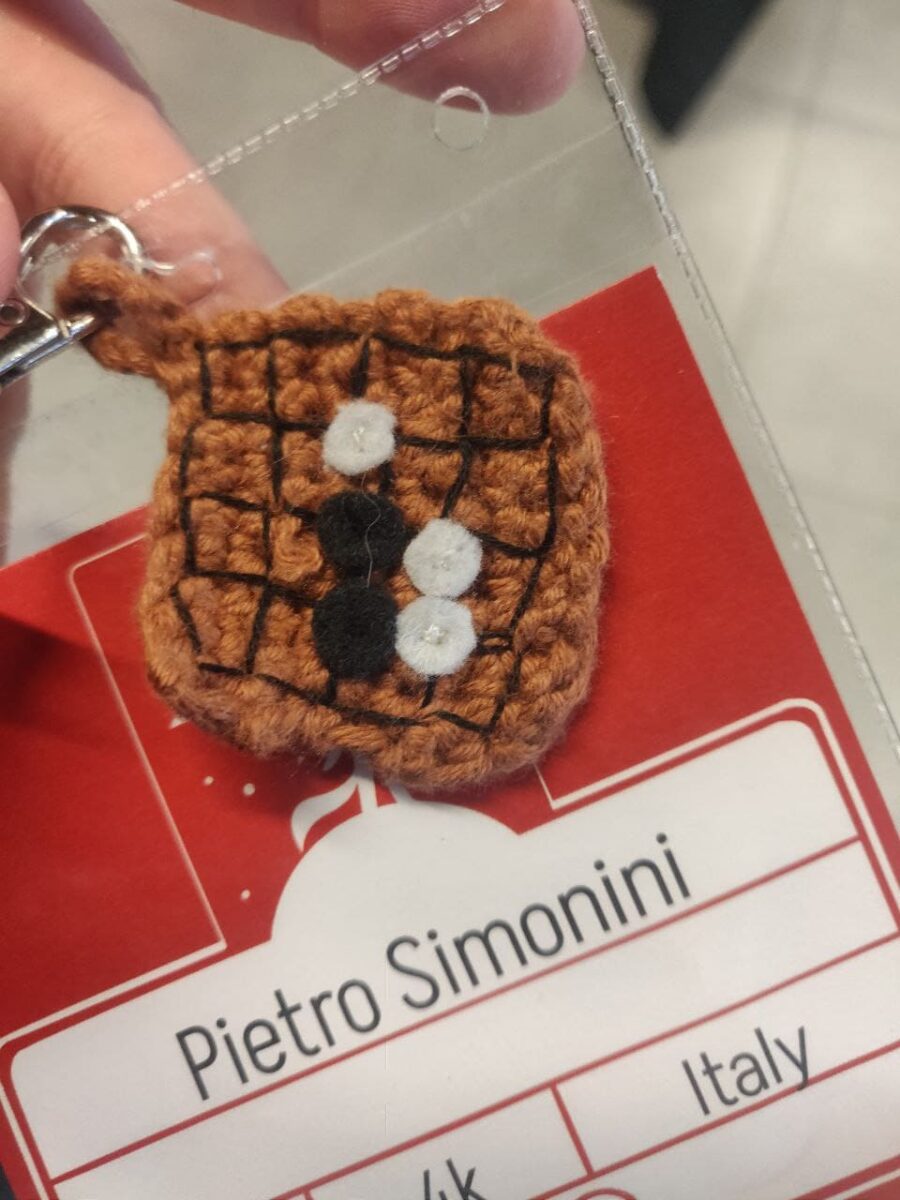
Which non-main event surprised you?
The number and variety of workshops and lectures available at all times is impressive. There’s always something interesting to attend, even if you’re not interested in all the side tournaments. I also loved visiting the shops to check out cool stones and boards, peek at books, and the like.
Of course, I ended up spending too much. In Toulouse, I got a set of slate and Japanese shell stones from an auction hosted by Baduk Club. Airport security searched my luggage twice on the way home after seeing these bundles of tiny round things in the X-ray.
In Toulouse, they also set up an art gallery with some really nice pieces.
I had never seen some of them before, which was surprising, considering how relatively small the Go world is.
Middle piece by Virgule_art, unfortunately I can’t remember the other 2 artists.
How do pros interact with amateurs outside workshops?
All will be available for reviews and simultaneous games at set hours; beyond that, it’s up to each of them, but most are very open to questions and requests for help.
Here’s my 15k (at the time) clubmate being collectively reviewed by Guo Juan 8p, Go book author Rob van Zeijst 7d, and two more high dan players at lunchtime.
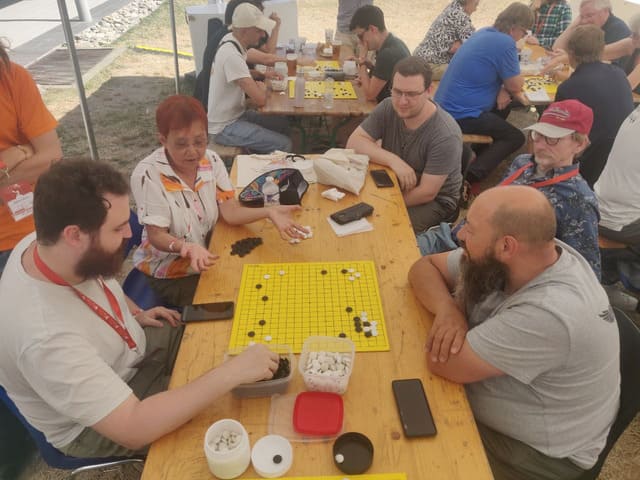
Some pros really go the extra mile and spend almost the entire time there helping other players. One such person is Kansai Ki-in professional Hayashi Kōzō 6p, whom I had the pleasure of meeting in Toulouse. On top of being an extremely kind and funny person, Hayashi sensei spent every waking moment helping others.
What’s one lesson you took home that changed your Go?
In Leipzig 2023, there was a lecture by Chinese pro Xie He 9p that I remember very well.
It was over the second weekend, and everyone was tired after seven days of games and lectures, so he chose to avoid technical topics and instead gave a lighthearted talk about the idea of 平常心 (the “simple mind”). This is a Zen concept that can be (very) roughly boiled down to focusing on the immediate and detaching oneself from further motives and future goals.
In the context of Go, it means you should remove all thoughts of winning, losing, changing your rating, or placing well in the tournament and care only for finding the next move. Xie He recalled an important game (against none other than Lee Chang Ho, if I remember correctly) that was going well for him until the moment the thought of winning entered his mind and derailed his Go, leading to a loss.
I’m sure I did a poor job trying to convey the meaning, but it really made an impression on me, and I try to apply it as best I can when I’m in an important game.
Share a story of an unexpected friendship formed at EGC.
A friend signed me up for the Pair Go tournament with someone I didn’t know, without telling me. My newfound partner for the tournament, Ms. Yifei, was a huge sandbagger—very capable—and we got to the semifinals before being eliminated (my fault, if we’re honest).
I later visited her in Zurich for the Swiss Go Championship. This is my revenge for the article she wrote about EGC and Pair Go in the Deutsche Go Zeitung .
What’s your survival tip for two weeks of non-stop Go?
If, like me, you have an addiction to buying books and other Go stuff, you should hire a caretaker to keep you physically away from the shops—it will cost less in the long run.
What’s your #1 reason to attend EGC 2025 that isn’t on the website?
The atmosphere! It’s impossible to properly convey in words, but if you’ve never experienced such a big event with Go players from all over the world, you definitely should try visiting.
EGC 2025: Warsaw’s Turn
This summer, the European Go Congress heads to Warsaw. The lineup includes the usual mix of serious competition (like the European Championship) and lighthearted side events—think Pair Go, Beer Go, and even sports hybrids for those who want to flex muscles and mental stamina. Beyond games, expect workshops with top pros and excursions to Warsaw’s historic heart.
The European Go Congress has always been more than just tournaments and trophies. It’s where lifelong Go friendships are made over shared struggles with joseki, where midnight blitz sessions turn into profound strategic discussions, and where players from dozens of countries discover their shared passion transcends language barriers.
This summer in Warsaw, a new generation of players will add their stories to this living tradition. Go Magic users will soon receive a special offer to help make their EGC experience even more accessible – watch your inbox for details.
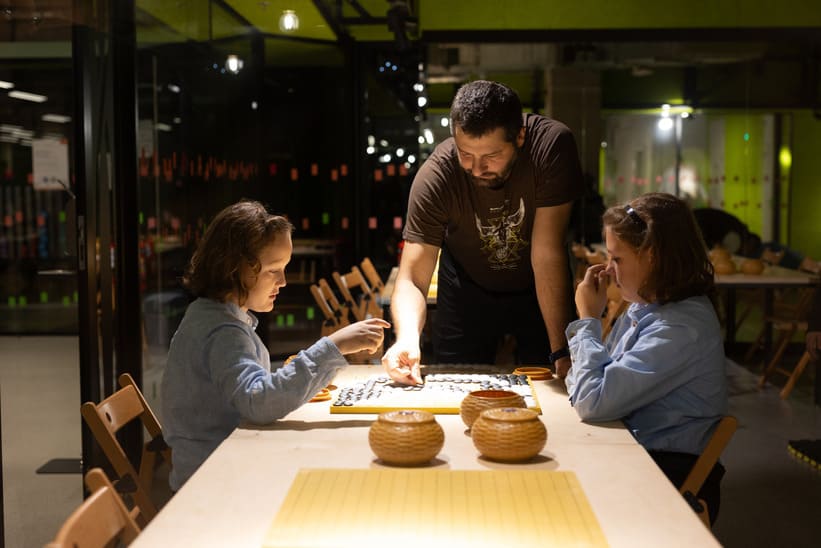
Whether it’s your first Congress or your tenth, the board awaits, the stones are ready, and the European Go community is excited to welcome you. The only question is – what kind of EGC story will you bring home?
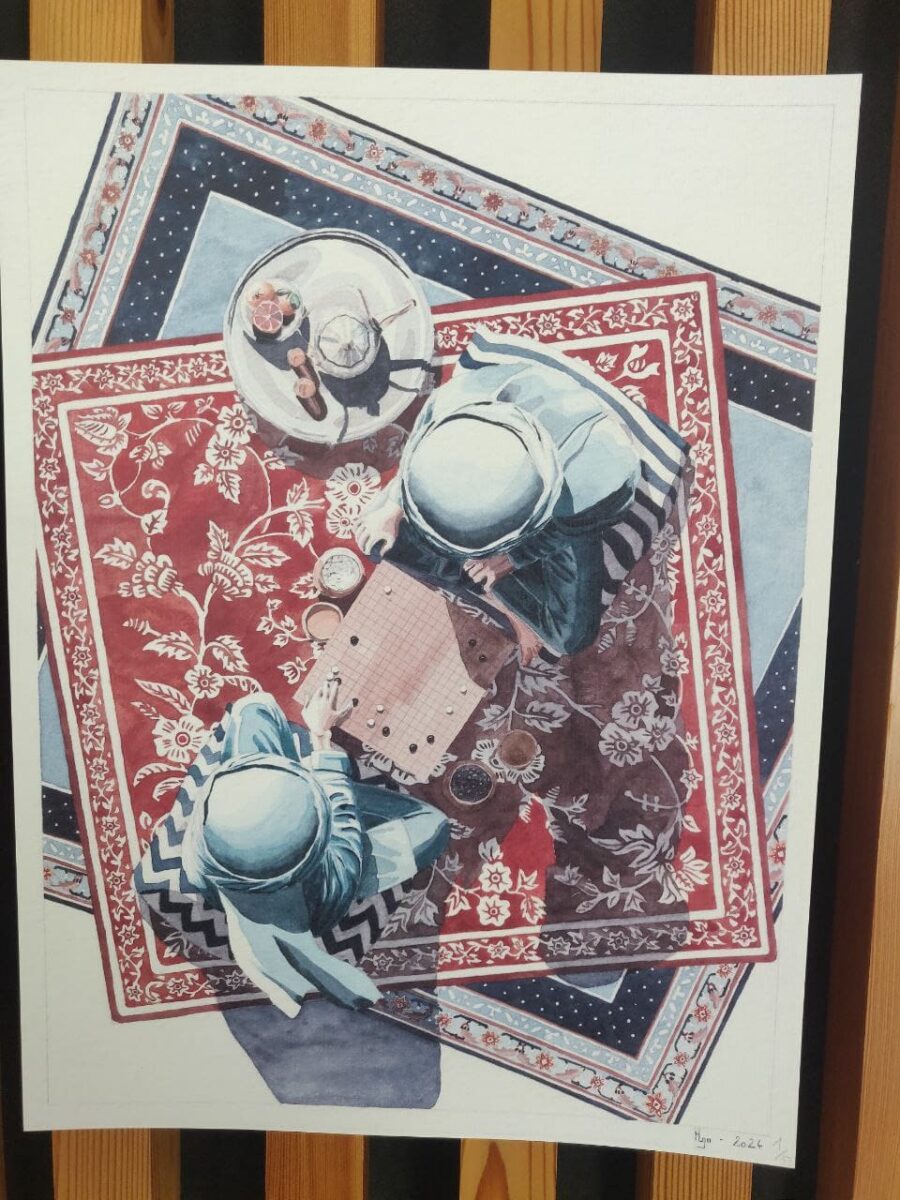
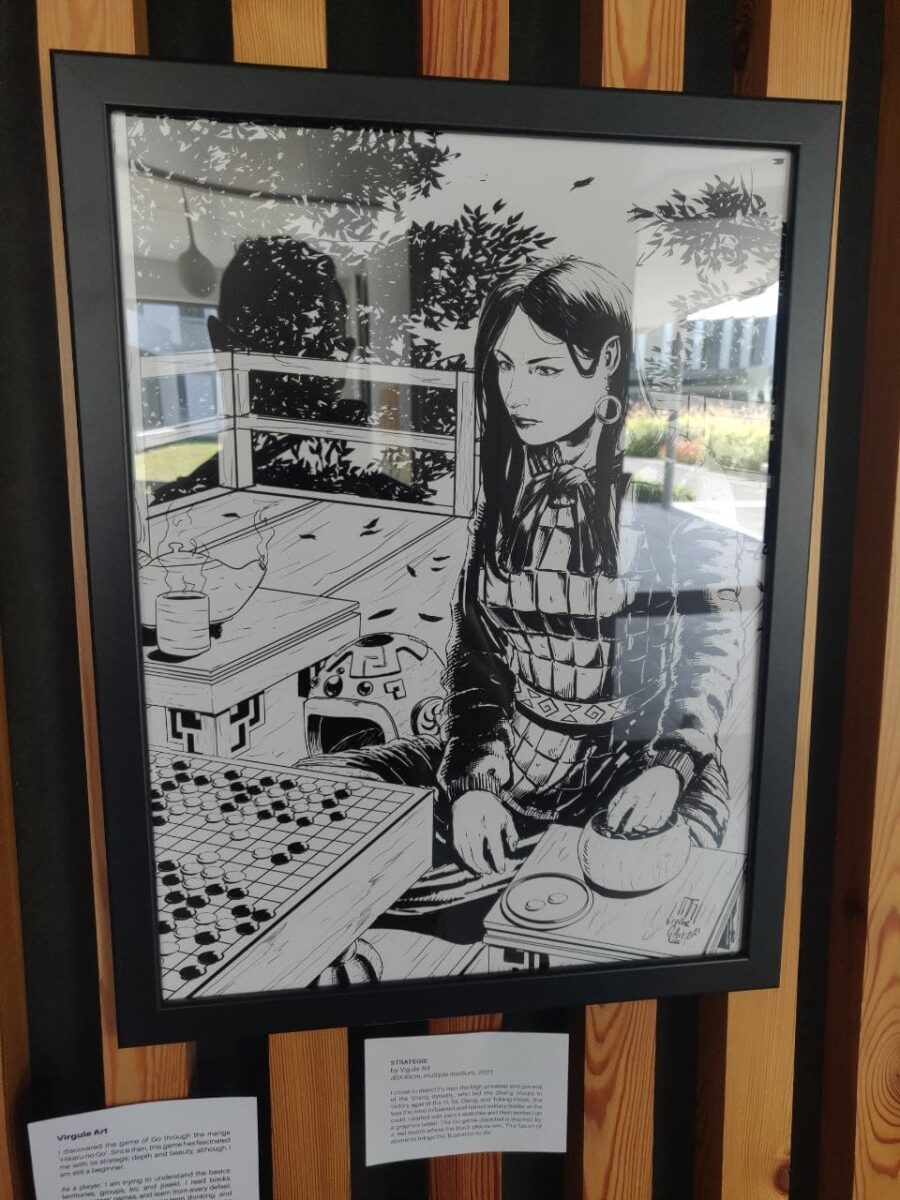
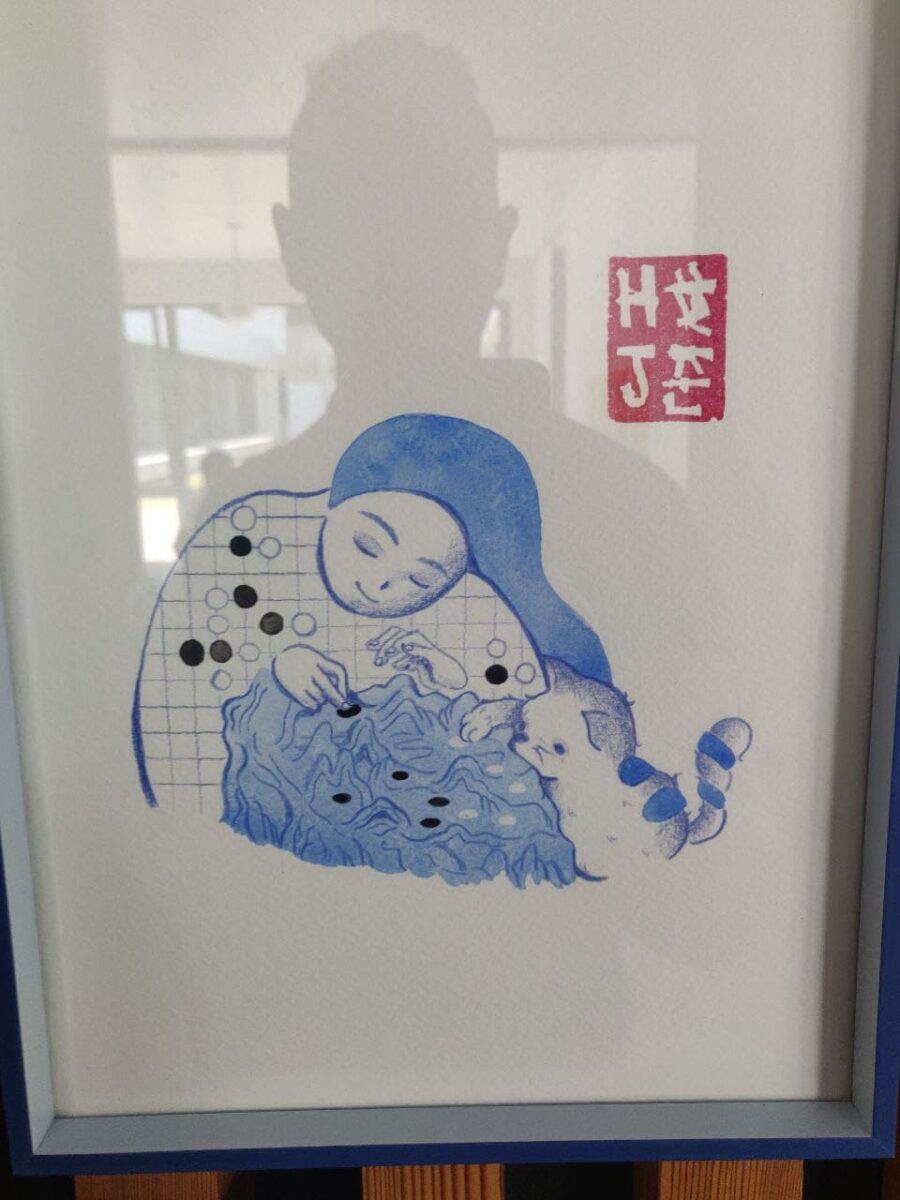
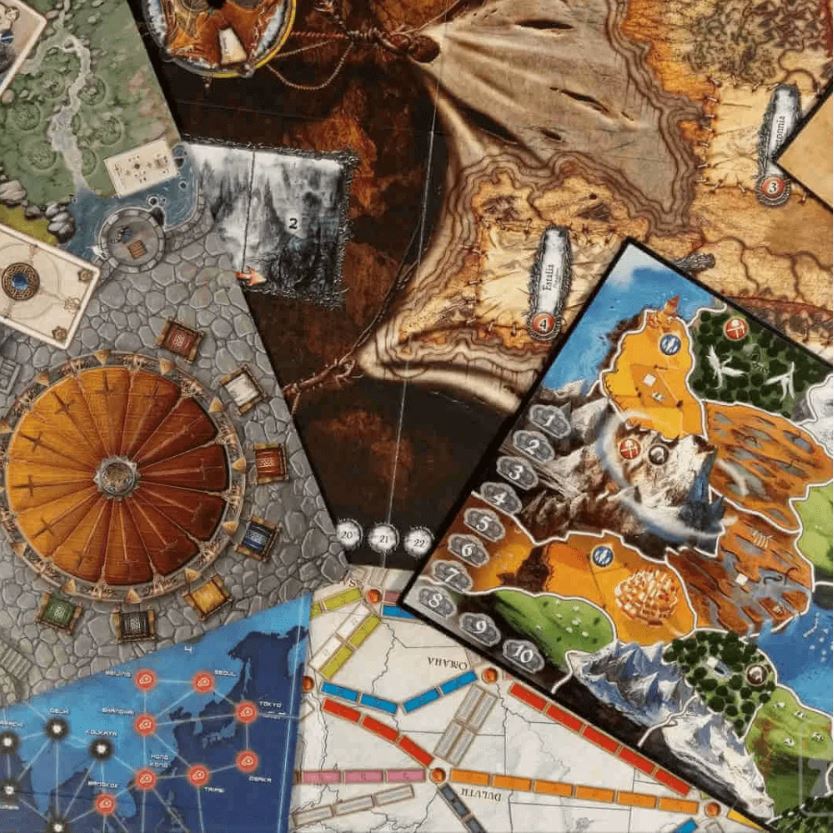
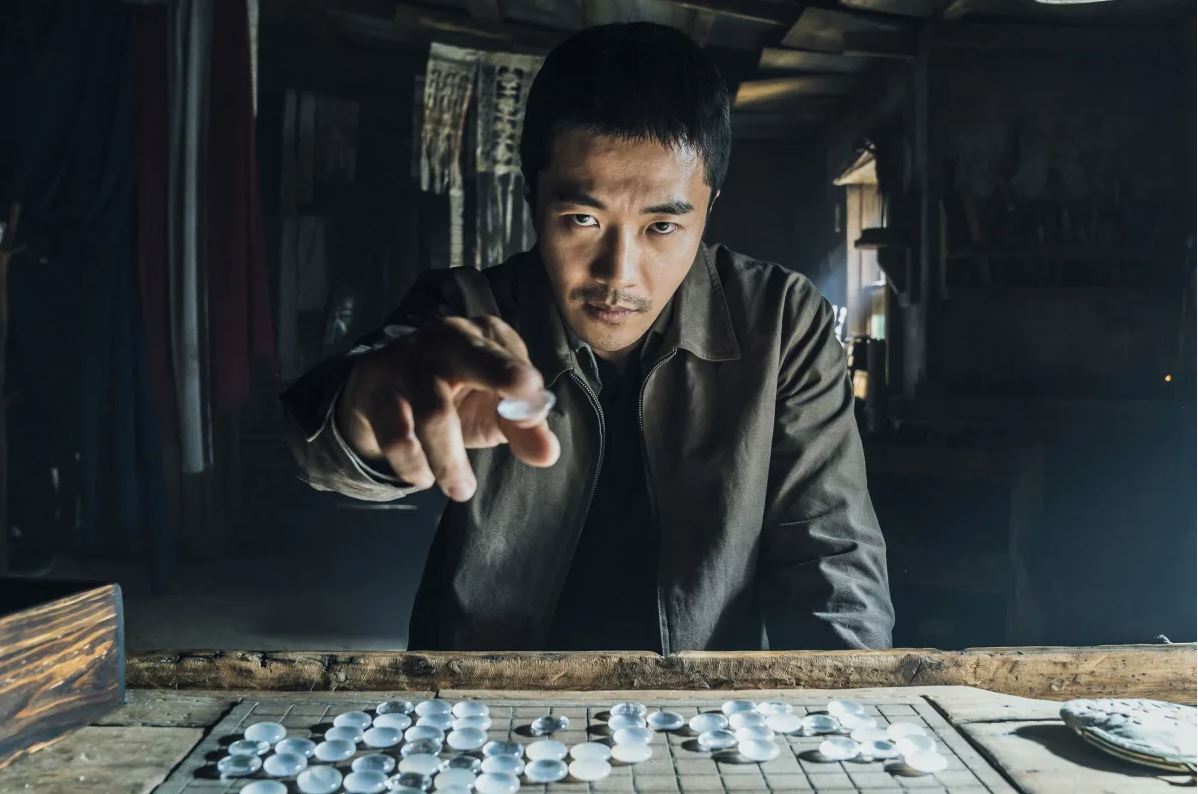
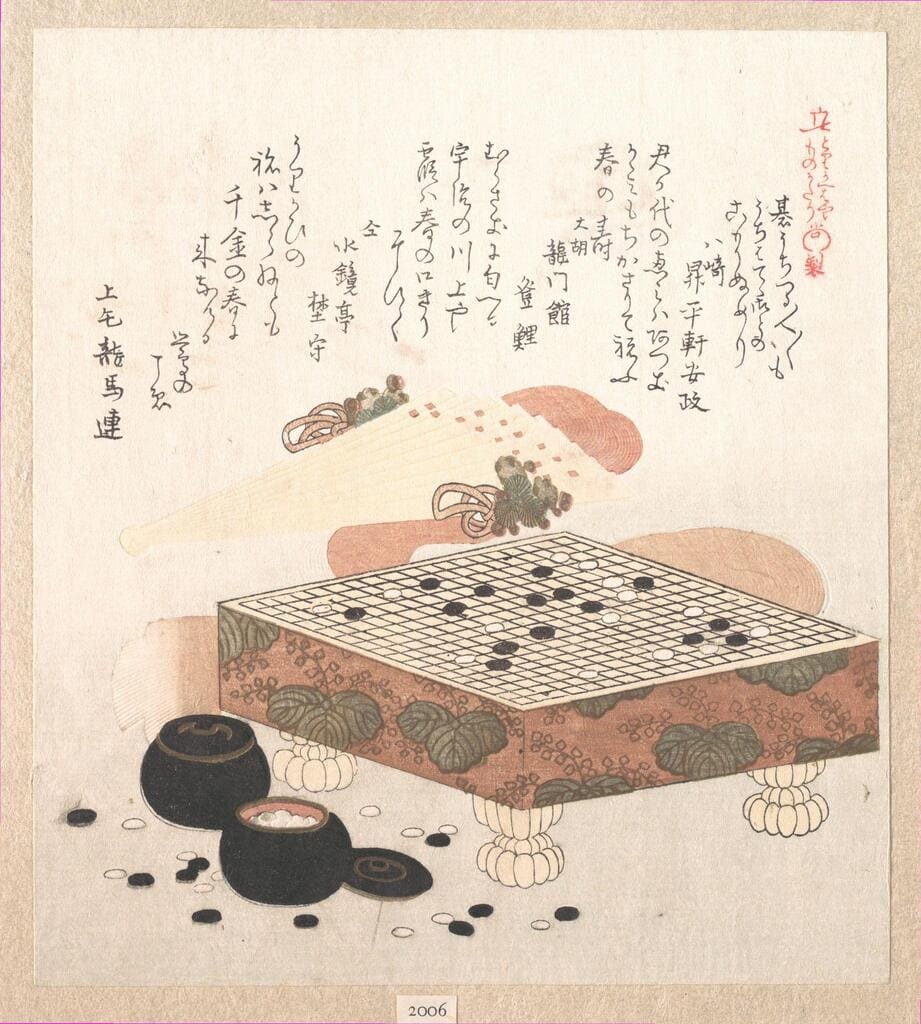
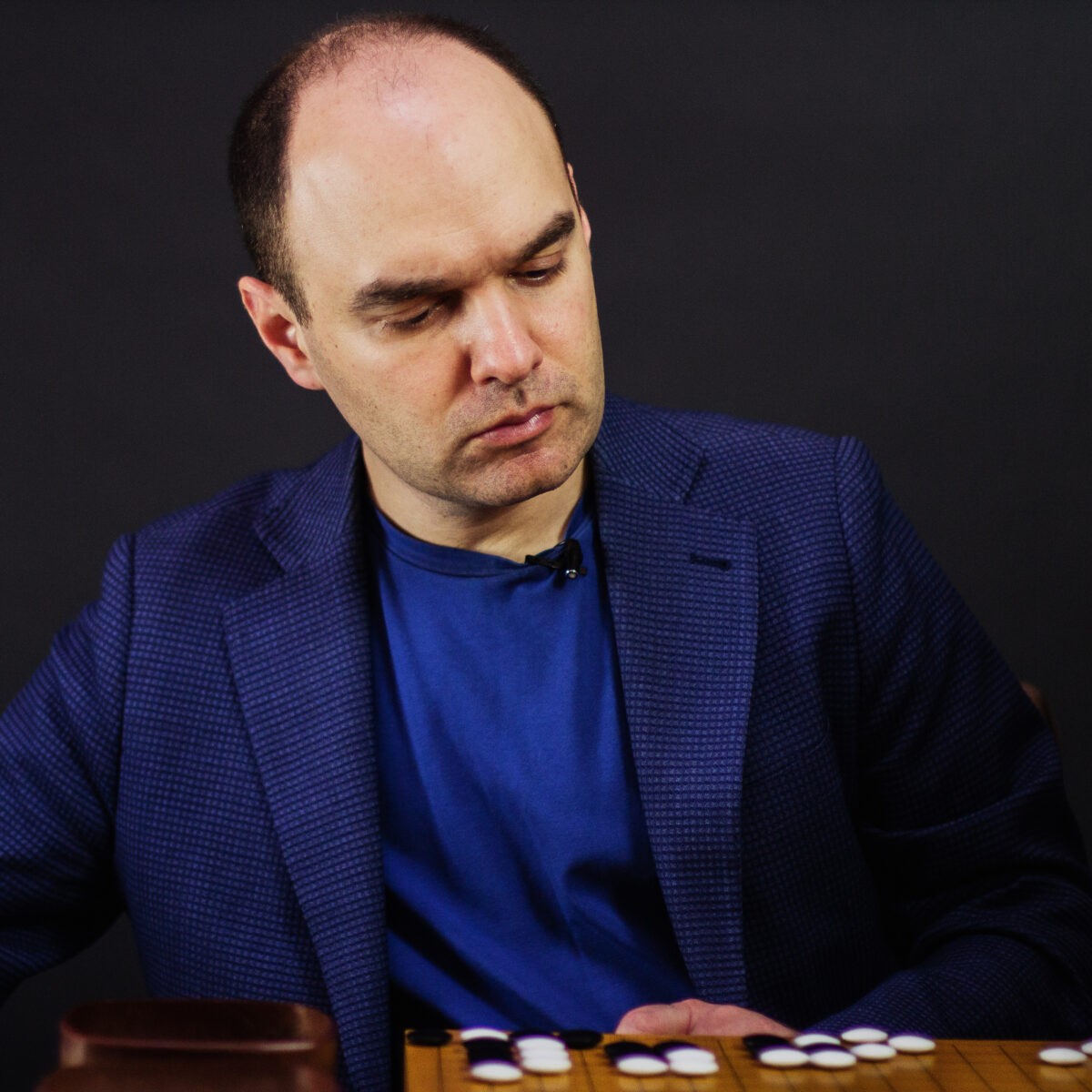
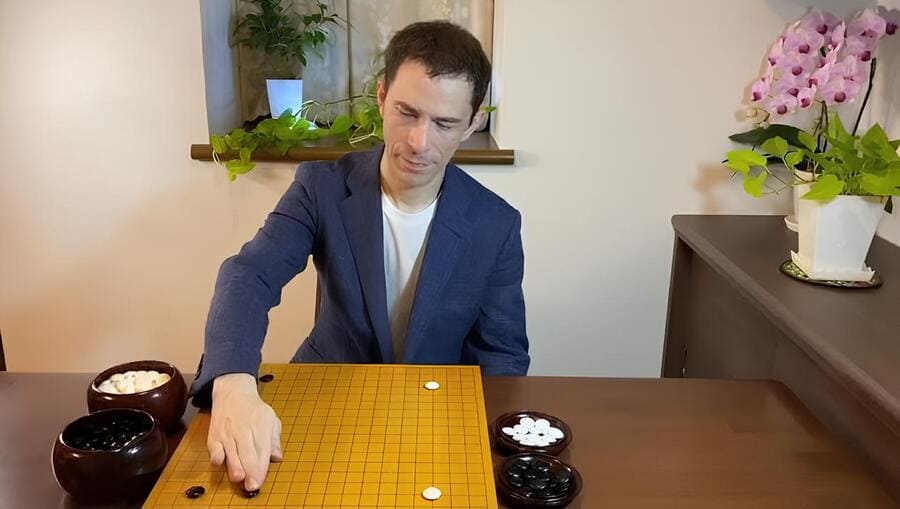
Оставить комментарий